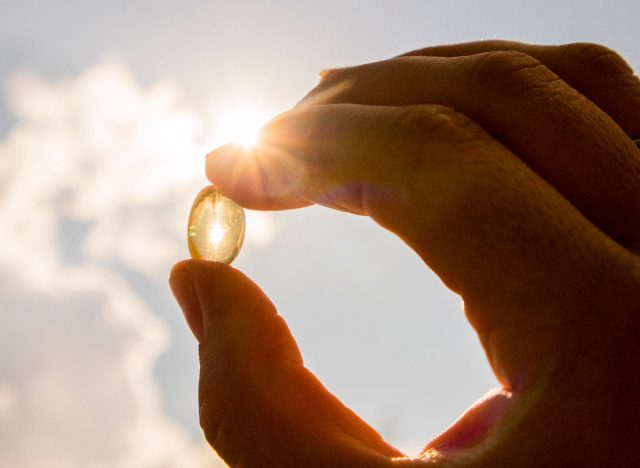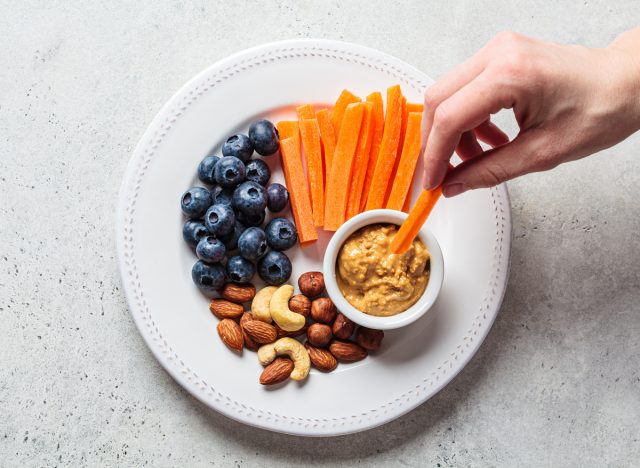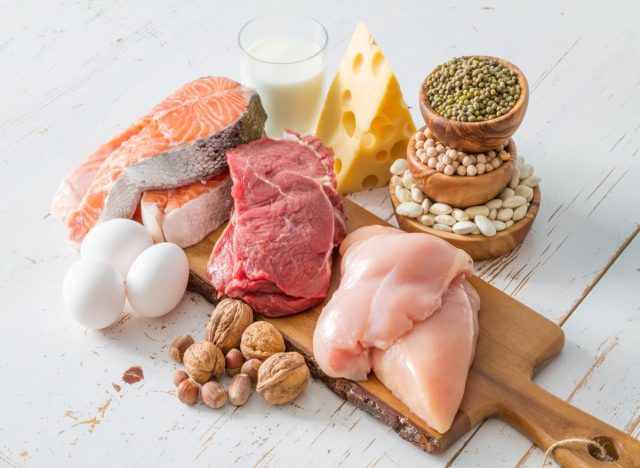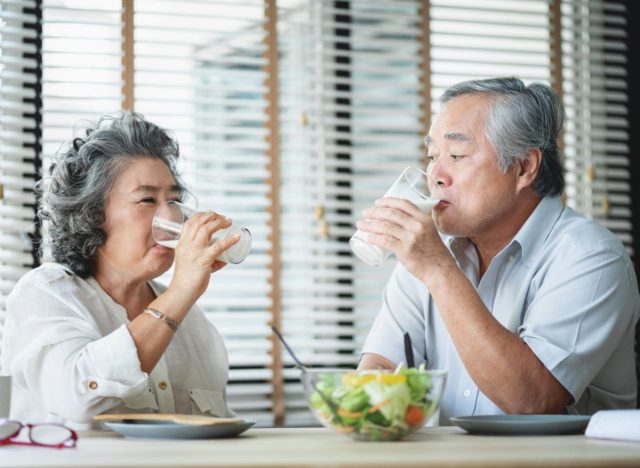Although we wish we could turn back time, aging stops for no one. That's why it's important to maintain overall body health as much as possible. It may not always be in your control, but there are certain aspects that you can target to ensure you're doing everything possible to stay healthy. Working out and following a balanced diet are two ways to support a healthy body after 50 years old and beyond.
If you don't know where to start or don't know how to, we've got you covered. Jessica Sylvester, MS, RD, LDN, CNSC, CDCES, Clinical Dietitian, Media Spokesperson for the Academy of Nutrition and Dietetics, and Owner of Florida Nutrition Group, shares with us the best eating habits to have that can help you maintain a healthy lifestyle if you're over 50.
Something to consider about these best eating habits over 50 is that "these recommendations are made for generally healthy adults without chronic medical conditions," explains Sylvester. "Dietary advice should be unique to the individual and their medical conditions.
Furthermore, Sylvester states that these are generalized recommendations. Always check with your physician and dietitian before initiating a new dietary routine.

Bone density is at its peak during your early twenties. After that, it begins to weaken.
"As we age, our bones begin to leach calcium and we become more susceptible to falls," Sylvester explains. "Sometimes, these falls are a result of bone frailty. Other times, they highlight diminished bone health."
Because these falls can be detrimental to our health and well-being, and may even be life-threatening, it's important to minimize the risk of falls and/or catastrophic results from a fall by "taking a calcium and vitamin D supplement daily." Not only will this supplement help preserve bone density, but vitamin D also plays a role in maintaining gut health, allowing your body to absorb the nutrients consumed.
If you want to go the extra mile, Sylvester suggests avoiding consuming dairy and meat in the same meal. "Dairy contains calcium, and meat contains iron; the two minerals negate one another in the body," Sylvester explains. "By eating them at the same time, you minimize the dietary benefits of both."

Many things may slow down as we age, and that includes our metabolism. "As such, older adults typically need to consume fewer calories during the day than they used to," says Sylvester.
While some people might notice that they are less hungry, others may have to adjust to this "new physiological adaptation." To do so, she suggests eating smaller meals throughout the day.
But because you're eating fewer calories at a time, it's important to ensure that you are still getting enough nutrients from your foods.
"To do this while eating fewer calories, it is best to eat more frequently throughout the day," says Sylvester. "This will ensure that you not only meet your caloric needs but your vitamin and mineral requirements as well." Vitamins and minerals help your body function properly and preserve your health.
But if you're still struggling with eating more frequent smaller meals while consuming enough nutrients, Sylvester recommends supplementation. "If you find it difficult to meet your caloric and nutrient needs throughout the day, take a high-quality multivitamin and/or sip on a nutrition supplement drink," says Sylvester. "Both are available at most pharmacies."

Consuming enough protein is important, but it's especially important as you age.
"Most adults begin to lose muscle mass as they age," says Sylvester. "Our muscles play a role in metabolic health, physical stability, and wound healing."
Consuming adequate protein helps to preserve muscle mass, thereby preventing sarcopenia—the age-related progressive loss of muscle mass and function.
"We often don't recognize the signs of sarcopenia because of increased weight gain and adiposity (fat) associated with the hormonal changes that accompany aging," says Sylvester. "So, while the number on your scale might be the same as it was years earlier, your body composition has likely shifted so that you have less muscle and more fat."
For healthy adults without chronic conditions, such as renal disease, dietitians recommend getting 20% of your calories from protein.
"Fortunately, there are many ways to supplement protein in the diet," says Sylvester. "Eating lean sources of meat, like chicken and fish, and eggs or beans is a good start. But, if you find you still aren't meeting those protein goals, look for a protein shake, bar, or even a protein cookie in your supermarket and pharmacy aisles"

As important as it is to eat, it's just as important to drink.
"Fluid recommendations are highly individualized to age, activity level, and health status," says Sylvester. "Most people need anywhere between 1.5 to 3 liters of fluids a day." One liter is about 33 ounces or about 4 cups.
"Our thirst mechanisms, the signals in our brain that tell us to drink, are not as strong in older adulthood as they are in childhood," Sylvester explains. "So, it's important to make a conscious effort to drink."
Meeting fluid recommendations not only prevents dehydration, "but it also plays an important role in maintaining a healthy metabolism," she adds.
In order to meet your fluid needs, Sylvester suggests using a small water bottle. Use one that you know you'll enjoy drinking from and can also carry easily throughout the day. Sylvester even suggests trying using a children's water bottle and committing to drinking at least 1-2 full bottles during the day.

Sylvester stresses the importance of seeing a dietitian for your dietary needs. (To find a dietitian, go to www.eatright.org and click on "Find an Expert".)
"Dietary advice is highly individualized and will differ according to age and medical history," she says. "The best resource for nutrition advice is a registered dietitian (RD); dietitians are the nation's nutrition experts with the ability to tailor your diet according to your specific needs."
As we age, our bodies become more susceptible to infection and disease. Many people feel their bodies become foreign to them as they age, and have difficulties adjusting to their nutrition needs. Dietitians will work with you and your physicians to address these changes by managing your diet in a way that preserves health.
Best Eating Habits To Have if You're Over 50 — Eat This Not That - Eat This, Not That
Read More


No comments:
Post a Comment